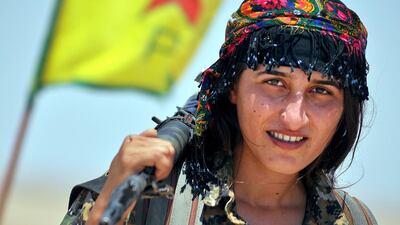Ever since they expelled ISIL from Tal Abyad in mid-June, Syria's Kurds have been at the centre of many rumours. In particular, there has been talk of upcoming battles against ISIL in northern Syria, including Kurdish-Russian cooperation.
The idea of a Kurdish-led offensive to capture Raqqa has been widely discussed in policy circles in western capitals in recent weeks. The idea has become more relevant since the Russian intervention, which many thought would include a campaign to retake Palmyra so Moscow could have a public-relations win over the US.
Fighting between ISIL and the Kurdish and Shia militias has become less intense in recent months. ISIL has turned to low-scale attacks in vulnerable or less strategic areas to avoid air attacks, primarily in Syria where the Russian air campaign has targeted groups that fight on two fronts against the Assad regime and ISIL.
This new reality, along with the recent breakthrough between Ankara and Washington about a Kurdish role in the war, spurred talk of a major offensive against ISIL in northern Syria, building on the success in Tal Abyad. The fact that the Kurds control key areas near ISIL heartlands in both Iraq and Syria, and that Syrian rebels have all but vanished from eastern Syria, leaves the Kurds and the regime as the only forces that could potentially provide ground troops for any air campaign.
Senior American officials have privately indicated that, while Shia militias have become weary and less incentivised to fight ISIL in Iraq, the Kurds have emerged as the mainstay in the US effort against ISIL in the two countries. This fact led to immense pressure on Turkey to ease the provision of logistics and training to the Kurdish People’s Protection Units (YPG) and their Arab allies, often referred to as “Kurdified Arabs”.
As a result, Turkey agreed in July to let US jets use the southern Incirlik airbase. On the insistence of Turkey and under pressure from the US, the YPG agreed to limit their military activities to east of the Euphrates river, something that apparently ended talks about Turkish-enforced ISIL-free zones from Aleppo to the Kurdish-controlled areas in the north-east.
To maximise their gains, the YPG have decided to take on ISIL in its own heartlands with the help of Arab insurgent and tribal factions – supposedly with a 50:50 ratio of Kurdish and Arab fighters. Regardless of whether there is indeed a plan for a Kurdish-led offensive in Raqqa, the idea clearly has the approval of some in the West.
But the proposal is as dangerous as it is fanciful. The idea appears to be more of an attempt to make political gains than a sound military strategy. It ignores both the tensions that could generate more support for ISIL and the military limits for such a major offensive.
ISIL, for example, controls southern Hasaka and has demonstrated its ability to revitalise fronts against the Kurds in the rest of the province when the latter make a move against it. The YPG have repeatedly attacked ISIL’s strongholds in southern Hasaka, primarily Shaddadi and Al Houl, with no success, even though they have some territorial advantage relative to the one in Raqqa. Also, the Kurds have to balance their capabilities in areas they control in Hasaka and the Arab demographic under their control that might play against them if they overreach.
The Kurds benefit from their presence on the two sides of the Iraqi-Syrian border (such as Al Malikiyah, or Dayrik, in Syria, and Rabiaa in Iraq) to defend those areas, but the situation is fluid. Similar to the regime-rebel dynamic in Aleppo, where a military stalemate has been established because both the regime and the rebels could open new frontiers if the other party attacks in a certain area, ISIL could stage attacks in Kurdish areas in Hasaka.
That is a risk the Kurds might not take since they know that Arab forces would control Raqqa if ISIL leaves, while they could control areas in Hasaka, which is part of their self-rule project.
Beside the military limitations, tensions caused by widespread belief that Kurdish militias have an expansionist project in northern and eastern Syria – exacerbated by recent incidents of ethnic cleansing as documented by Amnesty International this month – complicate any Kurdish-led effort outside Kurdish or mixed areas.
As the anti-ISIL coalition debates the merit of such attacks, ISIL has been advancing quietly and steadily in northern and southern Aleppo and in areas from Palmyra towards southern Syria. Its strongholds in eastern Aleppo, which seem more vulnerable than Raqqa, remain untouched. The idea of a Kurdish-led campaign in Raqqa, which follows a dormant one to retake Mosul in May, epitomises how the anti-ISIL coalition is losing sight of basic dynamics on the ground while ISIL entrenches itself in its territory and quietly expands elsewhere.
Hassan Hassan is associate fellow at Chatham House's Middle East and South Africa Programme, a non-resident fellow at the Tahrir Institute for Middle East Policy and co-author of ISIS: Inside the Army of Terror
On Twitter: @hxhassan

